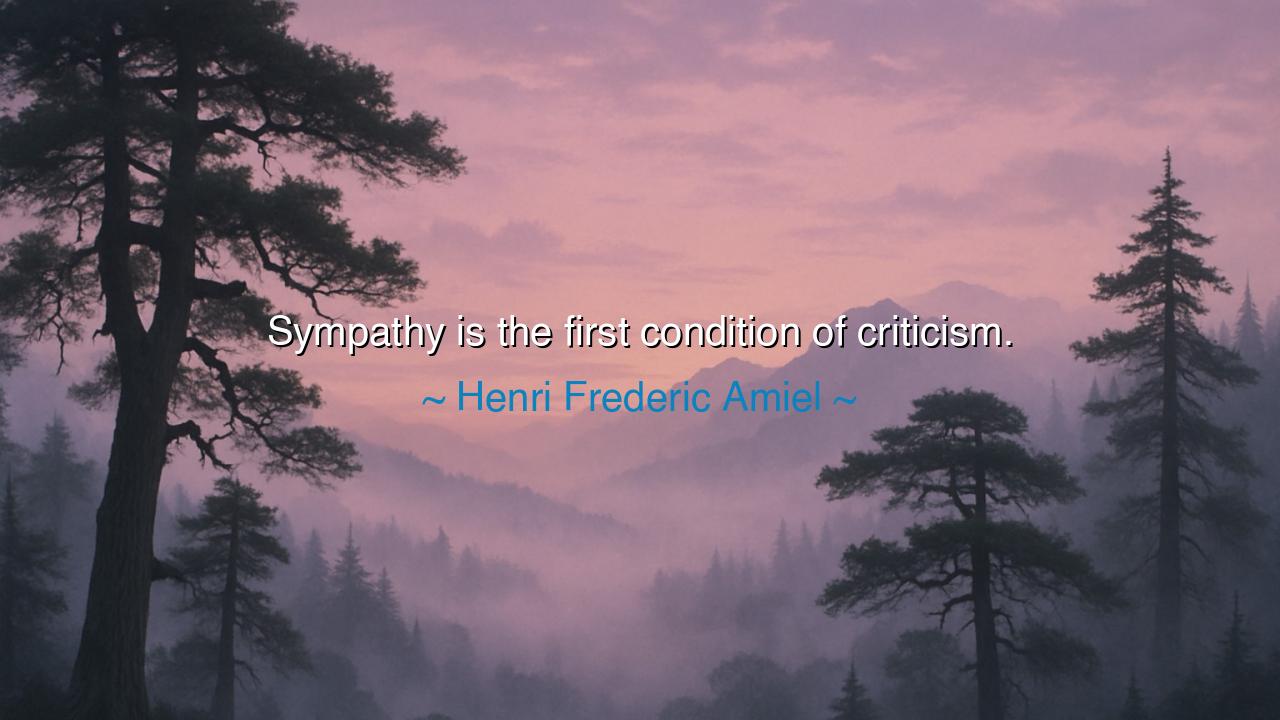
Sympathy is the first condition of criticism.






Hear the words of Henri Frédéric Amiel, philosopher of the heart, who once wrote: “Sympathy is the first condition of criticism.” This teaching, though brief, is filled with the wisdom of ages. For in it he declares that judgment, to be just, must first be softened by compassion. One who critiques without sympathy wields the blade of scorn, but one who tempers their analysis with understanding becomes not a destroyer, but a builder of truth.
When Amiel speaks of sympathy, he does not mean blind indulgence, nor the erasing of faults. Rather, he speaks of entering into the soul of another, seeking to see the work, the thought, the life, from within before passing judgment from without. True criticism is not the sneer of superiority, but the recognition of effort, of struggle, of intention. Only when we feel with the creator can we truly measure their creation. Without sympathy, all criticism is cruelty; with it, criticism becomes guidance and light.
The origin of such wisdom lies in Amiel’s own life as a teacher and poet. He saw the vanity of those who dismissed others too quickly, who mistook cruelty for intelligence. To him, the highest form of criticism was not to humiliate, but to uplift. In the lecture hall and in the quiet chamber of writing, he sought to teach that even the smallest attempt at art or thought deserves first to be understood. For only in sympathy do we honor the labor of the human spirit, and only in honoring it can we fairly weigh it.
History itself confirms his truth. Recall the story of Abraham Lincoln, whose words and deeds were often subjected to bitter attack. Many of his critics mocked him as unrefined, as unworthy of his high office. Yet it was those who first looked with sympathy, who saw his humble origins, his sleepless nights of care for a nation divided, who judged him most fairly. Their criticism, born of understanding, saw his strengths alongside his weaknesses, and thus endured as truth while the venom of others dissolved into dust.
The deeper meaning of Amiel’s words is this: that every act of creation—whether a book, a speech, a painting, or even the living of a life—is born of human struggle. To critique it is to enter into that struggle, not to mock from a distance. The critic who sees with sympathy asks: What was this person striving for? What difficulties did they face? What truth did they seek to express? By asking these, their words guide the creator forward. Without such compassion, critique becomes a hammer that destroys rather than a chisel that shapes.
Beloved listener, take this teaching into your life. When you must critique—whether in art, in work, or in the dealings of daily life—let your first step be sympathy. Do not rush to condemn, but pause to understand. If a colleague falters, ask yourself what burden they carried. If a friend fails, remember their effort before their mistake. Let your words correct, but let them also heal. In this way, your criticism will not wound pride, but strengthen spirit.
Therefore, walk as Amiel counsels: let your sympathy guide your criticism, so that your judgment becomes not a fire that burns, but a torch that lights the path. Critique without compassion breeds bitterness, but critique with compassion breeds greatness. For only when we first feel with others can we speak truth that will be heard, and only then does our wisdom become a blessing and not a curse.
Thus the teaching of Henri Frédéric Amiel endures: the first condition of true criticism is sympathy. Remember this, and your words will carry both justice and mercy, both truth and kindness—an inheritance of wisdom fit to be passed down through the generations.






AAdministratorAdministrator
Welcome, honored guests. Please leave a comment, we will respond soon